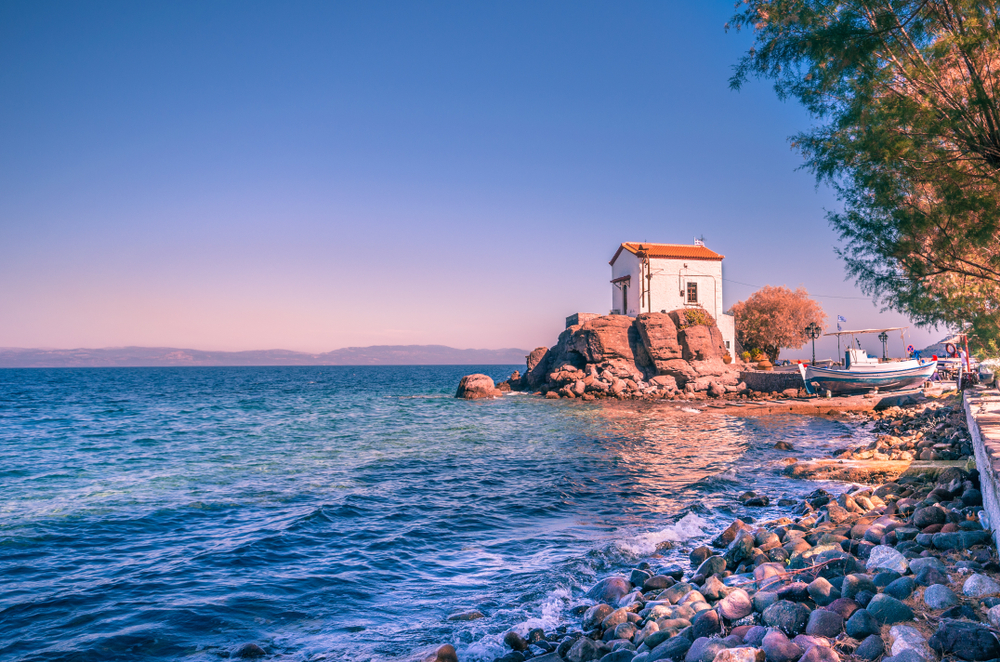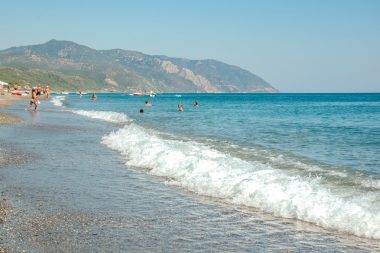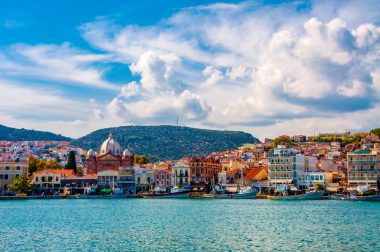
A trip to Lesbos leads to a beautiful Greek island in the northern Aegean, which is full of colors and contrasts. On the third largest island in Greece with a length of 70 and a width of 40 kilometres, Lesbos offers everything that makes a varied holiday in the land of the bright. On the coasts, pretty fishing villages with beautiful beaches await sun-seeking bathers and water sports enthusiasts. In the hinterland, mountains up to 967 metres high with great valleys and plateaus invite you to go on hiking tours. For gourmets, on the other hand, Lesbos is considered an insider tip among Greece’s islands due to its authentic cuisine. There are many reasons for a holiday on Lesbos.
Beach holiday on Greece’s third largest island

If you are looking for pleasantly quiet yet well-organized beaches in Greece as a beach vacationer or water sports enthusiast, Lesbos is one of the best addresses in the Aegean. The turquoise blue water is characterized by excellent quality and the Blue Flags waving over many dream beaches indicate the highest cleanliness of the well-kept areas. To the southwest, Vatera is home to the largest beach on the island. The eight-kilometre-long golden sandy beach slopes gently into the Aegean Sea.
Families, seniors and water sports enthusiasts alike feel at home here. Diving and surfing schools offer a service from training to rental. If you are looking for an adrenaline rush, you can admire the coast from a bird’s eye view while parasailing. Along the beach sections there are numerous taverns, bars and cafés, which offer everything your heart desires between cosiness and lively parties.
Just like in Vatera, the beaches of Eresos in the west or Petra in the north of Lesvos also attract visitors with a variety of water sports such as kayak tours or all kinds of surfing. At the foot of the mountain villages of Asomatos and Ayii Anargyri, thermal water with a particularly high radon concentration invites you to take a dip on Eftalou beach. This rocky beach is also a paradise for divers. Beach lovers looking for peace and quiet enjoy the remoteness of Gavathas or Chrousos beaches.
Holidays between Mytilene and traditional island villages
Lesbos inspires with pretty fishing villages and mountain villages. The gateway to the island is the capital Mytilene, which is well worth seeing. A stroll through the narrow streets and a coffee frappé at the lively harbour creates a wonderful holiday atmosphere. In the Archaeological Museum you can experience the varied history of the island and from the castle of Mytilene there is a great view of the coast.
Lovers of the visual arts should not miss a visit to the Terias Museum in the village of Akrotiri, where you can admire works from Chagall to Picasso. While the port city of Plomari is known as the location of ouzo distilleries and olive oil mills, the town of Madamados has become famous for its ceramic handicrafts. In the north of the island, the resort of Molivos looks back with pride on its famous son, the ancient poet Arion. Even better known is the coastal town of Eressos, which has developed into a holiday Mecca in the west of the island as the birthplace of the ancient Greek poet Saphho.
Active experiences in the Lesbos Geopark for nature lovers

The volcanic island is designated as a geopark and wants to be conquered with all its small natural wonders on eventful hikes. Mountain forests of pines, oaks and chestnuts, olive groves, pines and cypresses are the ingredients that, along with a variety of fragrant wild herbs, make up the green landscape of Lesvos. Numerous designated hiking trails, which lead along old donkey paths or pilgrimage routes, open up pretty mountain villages, chapels worth seeing, remote monasteries and ancient sites. The hiking areas on the limestone massif of the Olymbo are exciting.
Up to an altitude of 450 meters, fruit trees also mingle with the olive groves. Not only hikers look forward to a total of 14 waterfalls on Lesbos. The waterfall of Man’katsa is a popular destination for climbers with volcanic rock walls up to 20 meters high. A geological feature is the Petrified Forest in the west of Lesbos, where fossil tree trunks bear witness to the island’s primeval vegetation.
The Gulf of Kalloni, which juts deep into the heart of Lesbos on the south coast, presents itself as a natural paradise. Near the towns of Kalloni and Polichnitos, large seawater salt flats offer a great habitat for numerous birds such as stilts, avocets or herons. The secret stars, however, are flamingos, which can be observed in the Gulf all year round. In spring, the wetlands are a trendy stop-over for almost 70 migratory bird species, including black and white storks. The wonderful natural spectacle attracts ornithologists from all over the world to the island every year. The flora is in no way inferior to the biodiversity of the fauna. A real feast for the eyes are the numerous species of orchids that thrive in the Gulf.
Lesvos – Paradise for Gourmets
If you want to get to know the authentic Greek cuisine, you will also find paradisiacal conditions as a gourmet on Lesbos. The fresh catches from the fish-rich Aegean Sea are refined into absolute delicacies in restaurants and taverns. A delicacy of Mediterranean-Greek cuisine is sardines, which are caught in the Gulf of Kalloni. But the lamb or beef dishes braised with wild herbs from the island are also real highlights for gourmets. Of course, good food includes Greece’s national drink, ouzo. About one in three bottles of this anise spirit that comes onto the world market is produced on Lesbos. Plomari on the south coast is even considered the world capital of ouzo. But not only ouzo, but also olive oil extracted from Lesbos is one of the island’s export hits. A visit to an ouzo distillery and the olive oil museum in Polomari are definitely on the to-do list of a Lesbos holiday.
Facts about Lesvos
- Geography: Lesvos is the third largest Greek island and is located near the Turkish coast. The landscape is characterized by mountains, hills, fertile valleys and beautiful beaches.
- History: The history of Lesvos dates back to ancient times. The island was a center for culture, literature and philosophy. Famous historical figures such as the poet Sappho come from Lesbos.
- Tourism: Lesvos is a popular destination for tourists who want to enjoy the natural beauty of the island, the picturesque villages, the ancient sites and the beaches. Tourism is an important industry for the island.
- Cultural significance: Lesvos is known for its rich cultural tradition, especially in terms of literature, music, and gastronomy. The annual “Lesbian Festival” attracts visitors from all over the world and celebrates the cultural diversity of the island.
- Refugee crisis: In recent years, Lesbos has been a central point in the European refugee crisis, partly due to its proximity to Turkey. For a long time, the Moria refugee camp on Lesbos was one of the largest and most controversial refugee camps in Europe.
- Ecology: The island is also known for its natural diversity, including rare bird species and rich marine fauna. The protection of the environment is therefore of great importance for the residents and the government of Lesvos.

